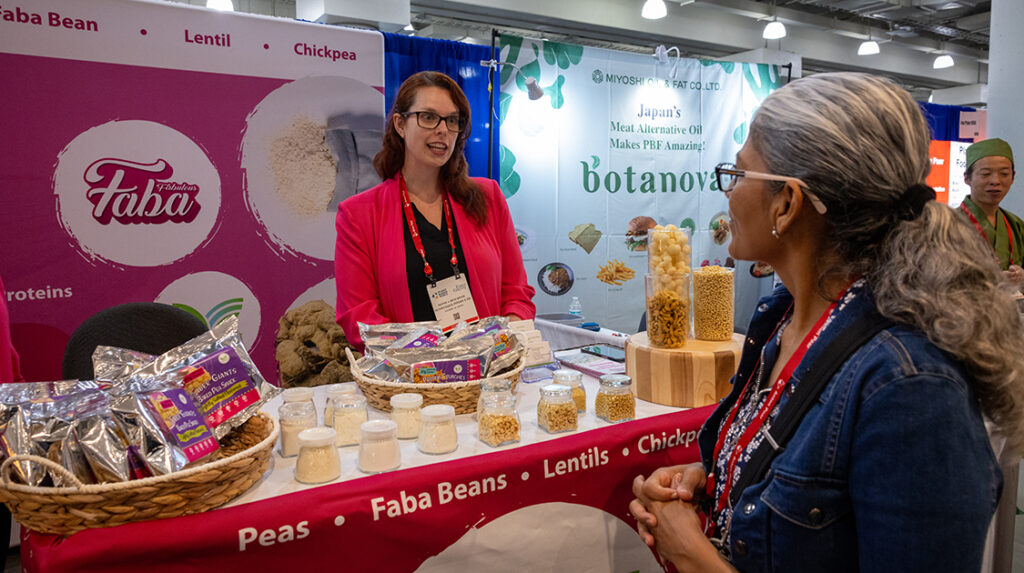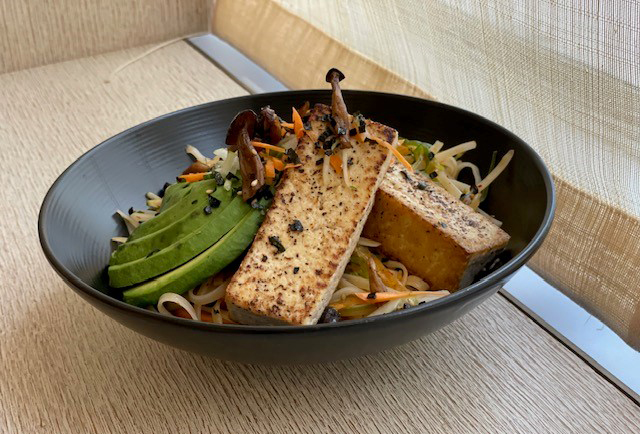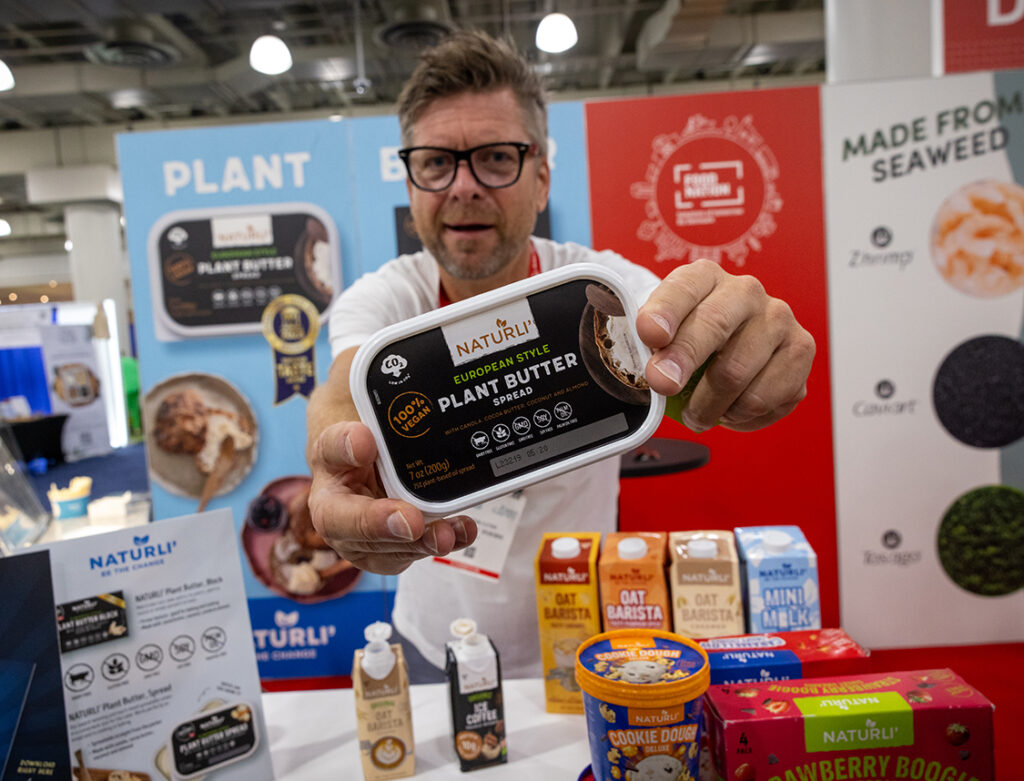10 trends taking root in plant-based dining
By Sara Perez Webber

Whether they’re vegan, vegetarian or simply want to eat less meat, consumers are increasingly embracing plant-based diets.
According to a 2023 Gallup survey, 4 percent of Americans are vegetarian and 1 percent are vegan. That doesn’t tell the whole story, however. Younger consumers are far more likely to eschew animal proteins. A 2023 YPulse survey found that 10 percent of young people describe their diet as vegetarian, vegan or plant-based. Up to 40 percent of consumers 50 and under are actively trying to incorporate more plant-based protein into their diets, according to a study by the United Soybean Board. And 72 percent of Americans describe the need for a more sustainable way of eating as “urgent,” according to an International Sustainable Food Barometer study commissioned by Sodexo.
Following are 10 trends taking root in plant-based dining, as caterers and chefs cultivate menus to meet sprouting demand.
1. More Menu Variety
Gone are the days when plant-based adherents had maybe one uninspired option to choose from at an event. “These days, our chefs incorporate plant-based menu items during the cocktail hour, salad course, entrée, dessert and at every meal period available to ensure delicious offerings for all,” says Melissa Johnson, vice president of Cameron Mitchell Premier Events and Community Relations in Columbus, Ohio.
The company’s corporate clients often request vegan options, and more guests and attendees for events of all kinds RSVP as exclusively eating or preferring to eat vegan meals. Johnson describes most Cameron Mitchell events as “hybrid,” adding that some social events—like baby showers, birthday parties and even weddings—are requesting completely vegan menus.

Steve Short, COO and chief culinary officer of Steve Short Culinary Team (SSCT) in Phoenix, says he’s seen a significant increase in plant-based demand in the last 10 years. The shift is most notable with SSCT’s Campus Provisions division, with clients including Arizona State University. “Higher education without question is where you see it the most,” says Short, though his company includes plant-based fare in all its menus. “We drive it into each event that we do, and we try to drive tremendous hospitality into those choices.”
2. Widening Appeal
The type of consumers gravitating toward plant-based is also expanding. “There is a noticeable shift in the demographics of people adopting plant-based diets,” says Ben Davis, content chair and strategic advisor for Plant Based World Expo, taking place Sept. 11-12, 2024, at the Javits Center in New York City. “Initially, these diets were predominantly embraced by vegans and vegetarians. However, we are now seeing a broader range of consumers, including flexitarians who are reducing their meat intake for health and environmental reasons.”

3. Plethora of Proteins
As demand grows, so do the options available for plant-based adherents and chefs. “One significant trend is the diversification of plant-based proteins,” says Davis. “Manufacturers are exploring a variety of protein sources, including peas, chickpeas, lentils and even algae, to create exciting new products across a variety of applications.”
Chef and dietician Micah Siva, author of NOSH: Plant-Forward Recipes Celebrating Jewish Cuisine, says the changes she’s seen in the plant-based scene since her career started have been remarkable. “The main options [used to be] Tofurky, tofu and beans,” she says. “Tempeh was a challenge to find. There were a few meat analogues on the market, but they were mediocre and few and far between.”
Now, however, “the whole category has exploded,” says Siva. “It has been so exciting to see this shift, and I can’t wait to see what happens in the next 10-plus years.”

4. Evolving Motivations
Caterers like Short emphasize plant-based dining as part of their commitment to protecting the environment. “When I think plant-based, I really do view it in the mind of sustainability,” says Short, who operates a 40-chef kitchen with zero waste and executes zero-landfill events, diverting almost all waste from landfills.
While ethical concerns regarding animal welfare were the primary drivers toward plant-based for many years, now health benefits and environmental sustainability are the leading motivations, according to Davis. “Consumers are more aware of the health advantages of plant-based diets, including lower risks of heart disease and other chronic conditions,” he says. “The environmental impact of food choices has gained prominence, with more people recognizing the role of plant-based diets in reducing carbon footprints and conserving natural resources. This shift indicates a more holistic approach to dietary choices, encompassing ethics, health and environmental consciousness.”
5. Keeping It Clean
Plant Based World Expo’s Davis also notes the trend toward clean ingredients in plant-based foods: “There is a growing emphasis on clean-label products, with consumers seeking out options that are free from artificial ingredients and additives.”
Some chefs steer clear of manufactured proteins altogether. At Steve Short Culinary Team, Arizona’s produce plays a starring role, with popular vegetarian stations such as grazing boards teeming with grilled vegetables and locally grown melons. “Vegan dishes are a little bit more challenging, especially with my desire to stay away from faux products,” says Short. “I don’t like using them. I don’t think they’re chef-generated or chef-driven.”

Siva explains why none of the recipes in her cookbook NOSH include manufactured meat alternatives: “First, I don’t want to use a product that might not exist in 10 years. With the marketplace changing, brands differ so greatly in quality, taste and availability. Cookbooks should work with ingredients, no matter the brand name! Second, as a dietitian, I wanted to focus on foods that would make you feel good, and to me, this is focusing on proteins like beans, legumes, tofu and tempeh.”
6. Sea Vegetables Surfacing
Sea vegetables are one protein category gaining traction. “I have seen seaweed grow in popularity over the past couple of years,” says Siva. “It has been so fun to watch these ingredients grow into the mainstream market.” The Good Eating Company—a foodservice firm with more than 60 client sites across the U.S.—aims for 40 percent of its entrees to be plant-based. The company, a Sodexo subsidiary, has made sea vegetables a staple on its menus, successfully testing three sea vegetable-focused dishes last fall at a site in New York, for example. “During the sea vegetable pilot test program, the three dishes served were a hearty fusion burger, rich Bolognese over cavatelli and a restorative sea vegetable salad bowl,” says Claire Turner, Good Eating Company’s director of sustainability. “At other client locations, we have created plant-based poke bowls using kombu marinated beets and daikon.”

7. Mushrooms Mushrooming
“Fungi such as mushrooms and mycelium are receiving a lot of attention for their versatility, mouth feel and flavor profile as both a processed and whole-food ingredient,” says Davis of Plant Based World Expo.
In NOSH, Siva included such recipes as Kasha and Mushroom Cabbage Rolls, and Savory Pulled Mushroom and Tofu “Brisket.” “Mushrooms are very big right now,” says Siva. “I use a lot of mushrooms in my recipes for taste, umami-richness, texture and protein.”
8. Milking It
As more consumers avoid traditional dairy products, they’re finding an array of choices to take their place. “Another notable trend is the innovation in plant-based dairy alternatives, with plant-based milks and cheeses making significant strides towards taste-parity with their traditional animal counterparts year after year,” says Plant Based World Expo’s Davis.

Good Eating Company works with Greener By Default, a nonprofit consultancy, to make lower-carbon menu choices the default option instead of a special request. In its barista bars, for example, Good Eating serves drinks with oat milk unless dairy, soy or almond milk is requested. At one client site, Salesforce in San Francisco, plant-based milk accounts for 60% of total milk purchases. According to Good Eating Company, defaulting to oat milk at St. Mary’s College of California led to a 32% reduction of dairy consumption, resulting in decreased emissions, land and water use by 25%.
9. Global Inspiration
By infusing plant-based menu items with globally sourced ingredients and flavors, chefs and caterers are making sure they’re anything but boring. Cameron Mitchell Premier Events creates “vegan offerings with an attitude,” says Johnson: “We have had great success with menu items using Middle Eastern spices and herbs like za’atar, cumin, nutmeg, cardamom and sumac. Another popular flavor is harissa, a hot chile pepper paste native to Tunisia and commonly used in North African and Middle Eastern cooking. Using these spices in our dishes has helped remove the stigma of vegan, plant-based and healthier fares as being bland or boring.”

NOSH is appealing not only to Jewish plant-based adherents looking to cook some of the dishes they grew up eating but also to those who relish variety. “Jewish cuisine is an ethnic cuisine, no different than Indian, Korean or Spanish cuisine,” says Siva. “People interested in diversifying their palates and bookshelf have been excited to learn about another cuisine that they may not be familiar with…yet!”
10. Comfort Foods
While diners enjoy discovering new flavors in plant-based cuisine, they’re also craving tried-and-true favorites. “One trend in product development is creating plant-based dishes that put a spin on traditional comfort food, such as mushroom bacon,” says Turner. At Good Eating Company, Senior Culinary Director and Chef Melody Miranda marinates mushrooms in maple syrup, paprika and olive oil, then bakes until crispy. The resulting “BLT” includes a vegan mayo which includes an aioli made from hemp seeds and flavored with lemon zest.
Cameron Mitchell Premier Events serves a vegan version of a Midwest staple—ranch dressing—while Steve Short Culinary Team’s vegan cookies are so popular that the kitchen produces about 10,000 each week.

For More Information
Cameron Mitchell Premier Events cameronmitchellpremierevents.com
Good Eating Company goodeatingcompanyus.com
Greener By Default greenerbydefault.com
Micah Siva noshwithmicah.com
Plant Based World Expo plantbasedworldexpo.com
Steve Short Culinary Team steveshortculinaryteam.com










